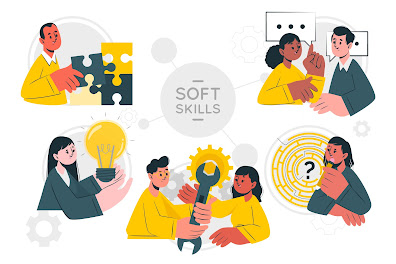Transforming Assessment: The Role of Technology and Modern Strategies in Vocational Education
Introduction
In the dynamic landscape of vocational education, the integration of technology and modern methodologies has revolutionized the assessment process. The advent of digital tools and platforms has not only enhanced the efficiency of assessments but also improved their validity and reliability. This blog explores the pivotal role of technology in modern vocational assessment, shedding light on how digital advancements align with the objectives of the Level 3 Certificate in Assessing Vocational Achievement (CAVA).
1. Digital Assessment Platforms:
Digital assessment platforms provide a centralized space for organizing and conducting assessments. These platforms streamline the process, making it easier for assessors to manage, deliver, and evaluate vocational assessments. With features like secure online submissions and real-time tracking, digital platforms contribute to the efficiency and organization of assessment procedures.
2. Adaptive Testing Techniques:
Modern assessment methodologies incorporate adaptive testing techniques. These methods adjust the difficulty of questions based on the learner's performance, providing a more personalized and accurate evaluation. Adaptive testing not only enhances the efficiency of assessments but also ensures a more valid representation of the learner's abilities.
3. Simulation and Virtual Reality:
Technology allows for the creation of realistic simulations and virtual reality scenarios in vocational assessments. This approach enables learners to demonstrate practical skills in a controlled digital environment. Assessors can observe and evaluate the application of skills, enhancing the validity of assessments and ensuring they closely mirror real-world scenarios.
4. E-Portfolios for Comprehensive Evidence:
E-portfolios have become powerful tools for collecting and presenting evidence of vocational achievements. Learners can compile a range of multimedia materials, including videos, images, and documents, providing a comprehensive view of their skills and competencies. This not only contributes to assessment efficiency but also enhances the validity of the evidence presented.
5. Real-time Feedback Mechanisms:
Digital tools facilitate real-time feedback mechanisms. Assessors can provide timely feedback to learners, promoting a continuous learning cycle. This not only enhances the learning experience but also contributes to the reliability of assessments by addressing issues promptly.
6. Artificial Intelligence in Grading:
The integration of artificial intelligence (AI) in grading processes improves efficiency and consistency. AI algorithms can analyze responses and assign grades based on predefined criteria, reducing the burden on assessors and ensuring a standardized evaluation process that enhances the reliability of assessments.
7. Online Collaboration Platforms:
Modern vocational education often involves collaborative projects. Online collaboration platforms enable learners to work together remotely, showcasing their ability to collaborate and communicate effectively. Assessors can observe these interactions, adding a layer of validity to assessments by evaluating teamwork and interpersonal skills.
8. Data Analytics for Assessment Insights:
Technology enables the use of data analytics to gain insights into assessment performance. Analyzing data trends allows assessors and educational institutions to identify areas of improvement, adjust teaching strategies, and enhance the overall effectiveness and validity of vocational assessments.
Relating the Topic to Level 3 CAVA
The Level 3 Certificate in Assessing Vocational Achievement emphasizes the importance of using appropriate assessment methods and technologies. By incorporating modern methodologies and digital tools, assessors pursuing this certification can:
1. Stay Current with Industry Trends:
The CAVA certification encourages assessors to stay informed about industry trends. Embracing technology aligns with this principle, ensuring that assessors are equipped with the latest tools and methodologies in the vocational assessment landscape.
2. Enhance the Efficiency of Assessments:
Efficiency is a key aspect of the CAVA qualification. Technology streamlines assessment processes, allowing assessors to focus on meaningful interactions with learners. The use of digital platforms aligns with the efficiency goals of the certification.
3. Ensure Valid and Reliable Assessments:
Validity and reliability are fundamental principles of vocational assessment. The integration of modern methodologies and digital tools contributes to the validity and reliability of assessments by providing accurate, standardized, and timely evaluations.
4. Facilitate Comprehensive Evidence Collection:
The CAVA certification emphasizes the importance of collecting comprehensive evidence. E-portfolios and digital evidence compilation align with this objective, enabling assessors to gather a diverse range of materials that offer a thorough representation of learners' achievements.
5. Embrace Continuous Improvement:
CAVA assessors are encouraged to contribute to the continuous improvement of assessment processes. The use of data analytics and technology facilitates ongoing evaluation and adjustments, ensuring that assessments evolve to meet the changing needs of learners and industries.
Conclusion
The role of technology, modern methodologies, and strategies in vocational assessment is pivotal in shaping the future of education. As we navigate the complexities of vocational learning, the integration of digital tools not only enhances efficiency but also ensures the validity and reliability of assessments. For assessors pursuing the Level 3 Certificate in Assessing Vocational Achievement, embracing these advancements is not just a choice but a commitment to providing high-quality, industry-relevant assessments that empower learners for success in their chosen vocations.

.jpg)


Comments
Post a Comment